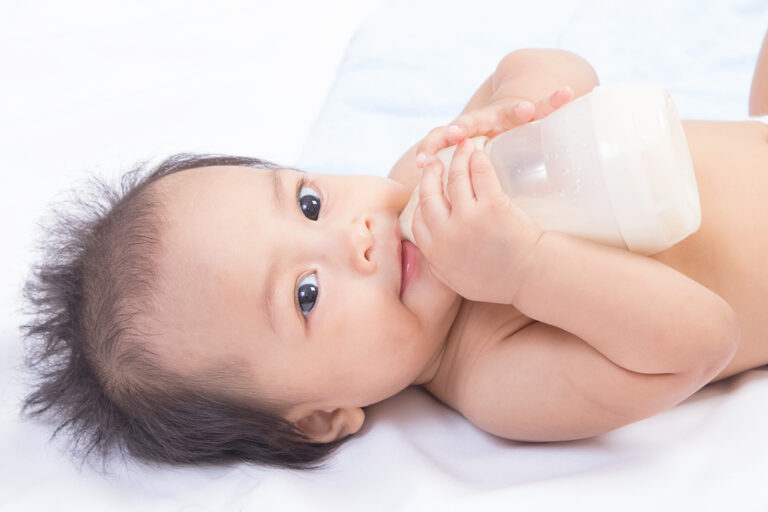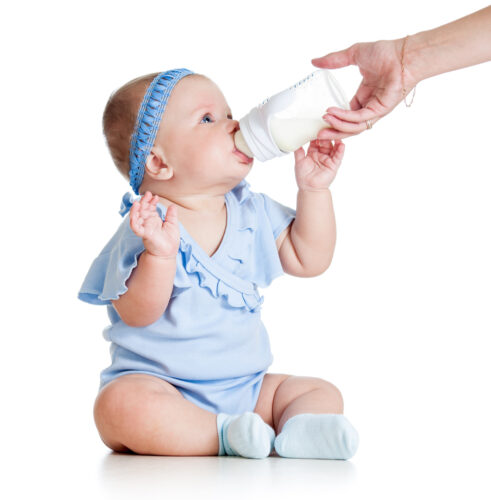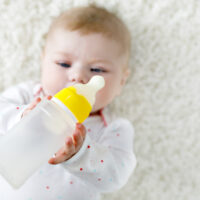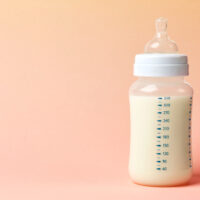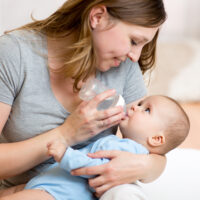After a while of bottle feeding, you will probably get sore hands, wrists, arms, and shoulders. It just happens.
It’s tempting, but you should never prop baby’s bottle up. It puts your baby at risk for choking since they can’t control the milk flow.
So, what can you do? Can baby hold their own bottle?
A baby can hold their bottle around the time they turn seven months of age.
You want to ensure they are developmentally on track, including sitting up on their own, strong neck muscles, and improving their fine motor skills.
What Age Can a Baby Hold a Bottle
Most babies can hold their bottle between 7-9 months.
Remember, each child is different, and yours may not be ready to hold their bottle at nine months. In addition, your child may never have an interest in holding their bottle, and that is fine.
You may even reach the point where your baby is fine holding a sippy cup but does not want to hold a bottle. What gives? They likely associate bottles with time with you and don’t want to give that up. My three kids never were interested in holding their bottle but were perfectly happy with a cup.
Signs Your Baby Can Hold a Bottle
There are several signs to look for when knowing whether your baby is ready to hold their bottle. This isn’t something you should push, so make sure your baby is completely prepared before you let them feed themselves.
Your Baby Has Stellar Neck Control
If your baby still reminds you of a bobblehead, they shouldn’t be in charge of feeding quite yet. A baby without reasonable neck control will have a hard time keeping the bottle in a proper position and may end up choking on the milk by drinking too quickly.
Since most babies have complete neck control by six months, they should be just fine to hold their bottle. They have a good amount of control at three months, but certainly not enough to keep their bottle.
They Can Sit Up on Their Own
If your little one is still a bit wobbly when you try to sit them up, refrain from letting them hold their bottle for feeding. They should sit unassisted for at least 10 minutes; however, longer is ideal.
In addition, sitting in a Bumbo or similar seat does not count as sitting up independently. While bouncy seats and other devices are a great place to keep your child for a moment, they aren’t ideal eating spots.
Finally, remember that most babies start sitting up unassisted around the 6-7 month mark, which falls quite nicely with the ideal time to let your baby hold their bottle.
Your Little One is Reaching for Food or Toys
Once babies are reaching for their food or toys around them, they are probably going to start reaching for their bottles as well. In addition, a sign your baby may be ready to hold their bottle is if they can reach for food and then bring it to their mouth.
It’s also essential that your baby can reach for things while sitting unassisted. This means no falling over when they are trying to get their favorite toy.
Tips for Getting Your Baby to Hold Their Bottle
While you should always supervise your baby while eating, there are some tips to ensure you succeed with feeding. Keep in mind, at the end of the day, your baby may prefer your embrace while feeding and have no desire to feed themselves.
Pick the Right Bottle
Some bottles are more manageable for babies to hold. The grip is better on them than others and helps prevent the baby from constantly dropping the bottle. I am a fan of the Tommee Tippee bottles because the middle part of the bottle goes inward, allowing for little hands to hold on.
Finally, I do not recommend letting your baby hold a glass bottle. Little hands often drop things, and there is too much of a risk of it breaking and your child getting injured.
RELATED: The Best Bottles for Breastfeeding
Don’t Force It
As much as you may want your baby to hold their bottle, it’s not necessary, so do your best not to force it. If your baby has no interest in feeding themselves, it may be detrimental to force them to hold their bottle.
With most developmental skills, your child will do something if they are ready. As much as you want them to do something, they will do it at their own pace.
Encourage Tummy Time
While it may not seem like tummy time has anything to do with your baby being independent at feeding time, you want to encourage muscle growth. While your little one may be at the age where they roll right to their back or even crawl away, you want to make sure they are strong enough to hold their bottle.
Tummy time works wonders for building the much-needed stomach strength babies require. It also helps develop the neck muscles that newborns lack. This is why newborns are just adorable bobbleheads.
Give Them a Hand
If you feel your baby is trying to hold their bottle but isn’t quite grasping it, help position their hands on the bottle. They may not quite understand the proper way to place their hands. Babies are quick learners, and sometimes it just takes a little guidance from you to help them on their way.
Things to Keep in Mind
While letting your baby hold a bottle to feed isn’t rocket science, there are a few things to keep in mind. Safety is critical when letting your baby feed, and it’s always a good idea to refresh yourself with some pointers.
Never Prop a Baby Bottle
Even if you think your baby is this close to holding their bottle, it’s essential never to prop up a bottle for your baby. It puts babies at a higher risk of choking and overeating. If you are propping up a bottle, it means they are not at the point where they can control the milk flow and likely will overfeed.
Never Leave Your Baby Unsupervised
While it’s nice to be off bottle duty, that doesn’t mean you should move around the house without keeping an eye on your little one. At a certain point, children don’t need to be watched every time they take a drink, but babies new to feeding themselves should always be supervised.
Keep the Bottle Out of the Crib
Your baby is now holding the bottle like a champ, and they are eager to take it to bed with them. Unfortunately, you should pump the brakes on your little one going to bed with their bottle. First, you are establishing a habit of your baby needing a bottle to fall asleep. Any pattern you form will inevitably need to be broken, so keep that in mind.
Secondly, it’s not good for your baby’s teeth to be drinking anything before bed without cleaning them first. Milk can easily collect in and around your child’s teeth and potentially cause major dental problems down the road.
Finally, it’s never a good idea to let an infant feed while unsupervised. If you stick your 8-month-old in their crib with their bottle, you cannot keep a good eye on them while they sleep.
FAQs on When Can a Baby Hold a Bottle
When should I wean my baby off of the bottle?
It’s ideal to start weaning your baby right around their first birthday. At this point, they should be able to drink out of a sippy cup. Babies can get very attached to their bottles, so this is sometimes easier said than done.
Children are more likely to have tooth decay and other dental issues the longer they drink from a bottle. In addition, some kids rely too much on the bottle and don’t get enough nutrients through solid foods.
Finally, make a point not to wean your baby off their bottle during any chaotic times. For most, it’s a sense of comfort, and that’s not something you want to take away from them during a stressful situation.
What can I put in a baby bottle?
It’s best to only stick to breastmilk or formula when it comes to filling up your baby’s bottle. Babies under one should not be given cow’s milk. In addition, it’s best not to serve your baby juice in a bottle as well. Babies who are six months and older can start receiving small amounts of water.
Babies shouldn’t be given juice before six months of age, but most pediatricians recommend holding out as long as you can. Some juices are very high in sugar and are not healthy for little ones.
Finally, it’s recommended not to let your baby go to sleep with their bottle. If they are drinking before they go to sleeping and not brushing their teeth, they are more prone to cavities down the road.
Does my baby need to learn how to hold their bottle?
The reality is, having your baby hold their bottle is partly for convenience but isn’t considered a milestone. While some babies love to feed themselves, others never care to hold the bottle themselves. If you are eager to get your baby to feed themselves, consider getting a sippy cup with a straw that makes it easier to drink.
My babies had no desire to hold their bottle, so I would put some breastmilk in a cup for them, and they loved it. Offering sippy cups also helped wean my babies off of their bottles. We have a great list of the best sippy cups perfect for making the switch from bottles.
Finally, while it is nice to have your hands free for a bit, remember this is only a phase. Your baby won’t always need you to hold their bottle, but you are just where you need to be right now. It may seem tireless, but I promise you will cherish these memories as the years go by.
Final Thoughts
If you are eager to get your baby to hold their bottle, remember to wait until they are about seven months old. They should be sitting up on their own and starting to reach for things around them. Make sure never to let them feed themselves if they are in a Bumbo or bouncy seat.
In addition, holding a bottle is not considered a milestone for babies, so don’t feel like your little one has to reach that point. Some babies are perfectly content with you being their bottle holder day in and day out. Enjoy the cuddles!
